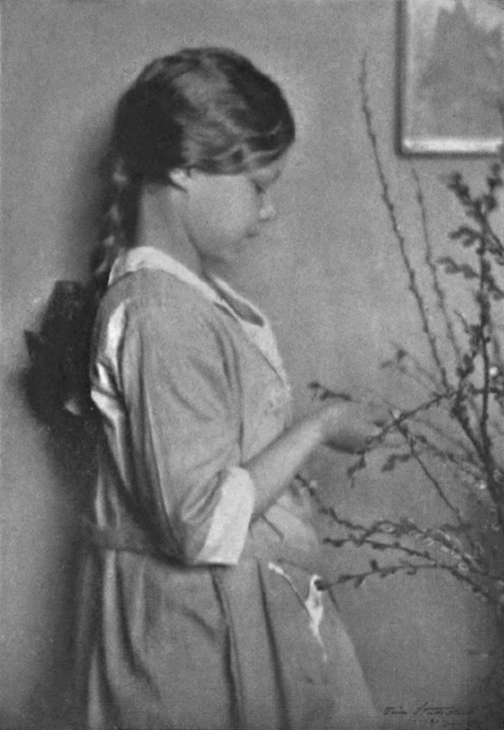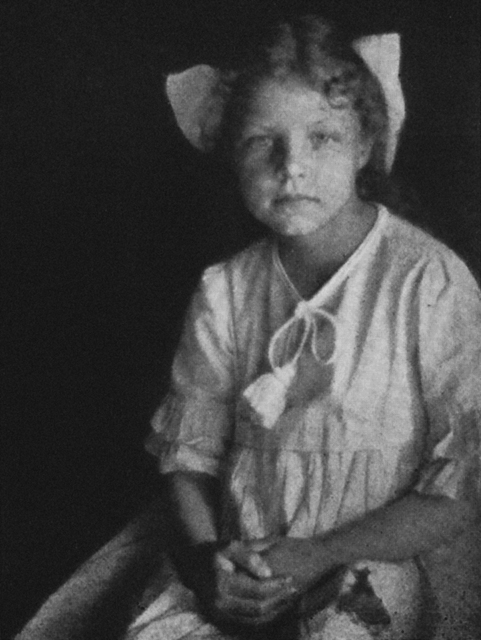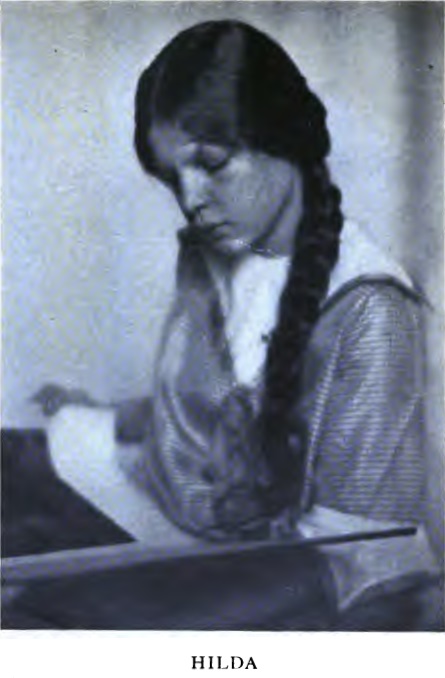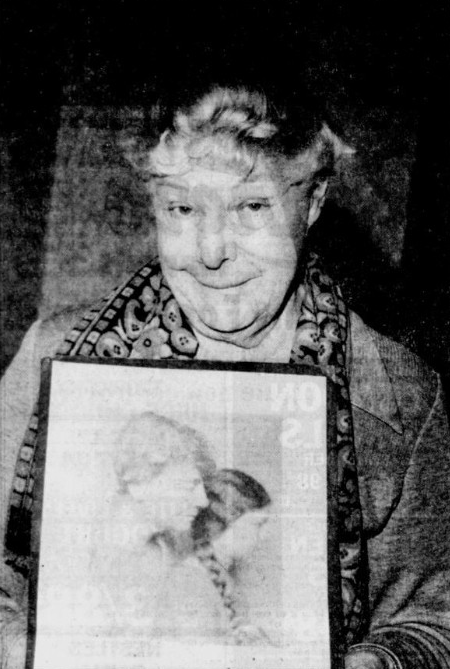When a child seems precocious and does things generally regarded as above the capacities of her age, one often wonders what role her parents did play in her achievements. Did she develop her gifts by herself, independently of any adult influence? Or did her parents encourage her talent? Or did they train her intensively like a circus animal in order to artificially create a genius?

I will consider here Hilda Conkling, the child poetess born in 1910 who started reciting poems at age 4, published her first volume at age 10, and finally ceased composing poems in her teens. It is said that she never wrote down her poems herself, she recited them to her mother, the poetess Grace Hazard Conkling, who recorded them on paper; then Hilda abandoned poetry when her mother stopped writing down her poems.
Like Sabine Sicaud and later Minou Drouet, some people have called her a fraud, claiming that her poems had in fact been written by her mother. The poetess Amy Lowell, who prefaced her first book in 1920, clearly denied this accusation, explaining how her poems reflected the free mind and spontaneity of childhood.
There is not much biographical information available on Hilda Conkling, but the AP newsfeatures writer Nancy Shulins interviewed her and wrote for the Reading Eagle, Sunday January 2, 1983, page 66, an article entitled “At 72, former child poet still haunted by artistic ‘handicap’.” I will quote it extensively.
First, Hilda does not keep a fond memory of her short poetic career:
When she speaks of her poetry, Hilda Conkling doesn’t use the word “gift.” Instead she calls it a handicap. It has taken a lifetime to recover.
The poems she started composing in a child’s singsong before she was old enough to print her name haunted her through adulthood, putting 20 years of her life in parentheses.
Then she tells that her poetic activity started spontaneously, without any adult guidance:
“I was 4 when it started, when I began ‘talking’ poetry,” she said. “At 4, you are not yet influenced by adults. You go your own self-centered way, a clean slate, a blackboard on which nobody has written.”
But for some reason, her gift seems to have gone:
Sadly, she shakes her head.
“That this head could say those things and it can barely write a letter now!” she said.
She confirms that her mother wrote down her poems, but at the time Hilda seemed not to pay any attention to this fact, since Grace Conkling was a writer who always had a pad in her hands:
She remembers little of those early years, but her mother, Grace Hazard Conkling, a divorcee and an English professor at Smith College in Northampton, told her that most of the poems came at night, when she was being put to bed.
“I didn’t realize mother was writing down what I said,” she said. “She wrote poems, too, and always had a pad in her hands, so it didn’t seem unusual, me babbling, her scribbling.
“But later, she’d read them back to me, and I always knew if she’d taken a word down wrong, I could always correct her.”

Her poems were published first in magazines, then collected in a book. Soon came success, visits from poets, having to sign 500 copies of her volume. But public attention could also be scary:
She remembers being interviewed, at 10, by Ladies Home Journal. She also recalls a rare outing to the movies with her friends. Douglas Fairbanks’ appearance on the screen was preceded by the newsreel. To Hilda’s horror, she was the star.
“There was my face on the screen,” she said. “I could’ve died, especially when the other children started pointing and laughing. As you can imagine, I took a dim view of the whole thing.”
Then she explains how as a little girl she suffered from the authoritarian attitude of her mother, while she loved going out in her garden or in the woods, and indeed flowers, trees and birds appear often in her poetry:
“Mother was very dominating,” she said, “and she was often high-handed and adamant in her decisions. It was always: Do this, that, and the other thing. To be fair, she was just as hard on herself as she was on my sister and me. But she was difficult to get along with.”
When her mother allowed, Hilda fled out of doors to watch the brooks, study the trees and pick the flowers that fed her imagination.
At bedtime, she recalled in poems the things that had shaped her days. Simple things delighted her, like roosters and poplars. And the lone dandelion in her yard.

We will now see why Hilda Conkling ceased to compose poetry as she grew into her teens. As a child, she had just recited her poems as a kind of fun, without realizing how beautiful and important they could be. At that time her mother wanted to record and publish them, but later, she decided that Hilda had to grow up, live in society and give up her inner poetic world:
Amy Lowell once told her mother that if Hilda survived “the cutting and drying process that goes by the name of education,” she would become a poet.
But the cutting and drying took its toll. Somewhere in her early teens, Hilda stopped writing poetry.
“Mother had downplayed the poetry, fearing I would become too self-centered,” she said. “As a result, perhaps she leaned too far the other way. I was never aware that I’d said or done anything remarkable.”
The royalties on her books helped pay for Hilda’s education, but she seemed not to have any projects for her life, her mother was still making decisions for her:
“I didn’t seem to have any career ambition at all,” she said. “As long as someone handed me three meals a day, I wasn’t knocking myself out. Mother finally pushed me out the door.”
She held various jobs, working with underprivileged girls in Boston, gifted children in Virginia, and for the Bureau of Standards in Washington.
At 40, she became manager of a bookstore in Boston, where she stayed 20 years. Then she came home to Northampton, moved in with her mother, and worked at a local bookstore.
“In her last few years, mother became more and more dependent on me. But I was starting to understand her better, and if she’d lived five more years, we might have become better friends,” she said. Grace Conkling died of a stroke in 1958.
However, 25 years after her mother’s death, Hilda seems to still be dominated by her powerful personality, as she does not dare to read her diaries:
She has published no more books. But some days, at bedtime, a thought or a mood will spark a new poem.
“One doesn’t get wealthy being a poet. One still has to make a living,” she said.
She dreams of writing her autobiography, and she reads through the old books by lamplight, piecing together a childhood from the yellowed poems.
Her mother’s diaries, which she keeps, might hold answers. But having been trained never to look through her mother’s things, she cannot bring herself to read them.
She says she feels at peace.
“My road is paved with might-have-beens and if-I’d-only-knowns. What keeps me going is my interest in what’s going to happen next, my pleasure in the turning of the seasons, in the way things are.”
Hilda Conkling died in 1986. It seems that she never published her autobiography, and she did not write any new poem. I do not know what became of her mother’s diaries.

The picture of Hilda that this interview gives is of a weak-willed little girl dominated by the towering personality of her mother, who made all important decisions concerning her life. Hilda was intelligent, sensitive and gifted for poetry, which seemed to flow naturally from her; but she did not realize how important that gift was. Her mother first supported her poetry, then later decided to discourage it, and so Hilda found herself without any project or ambition, leading a banal and uneventful life.
Previously published on Agapeta, 2016/02/10.

